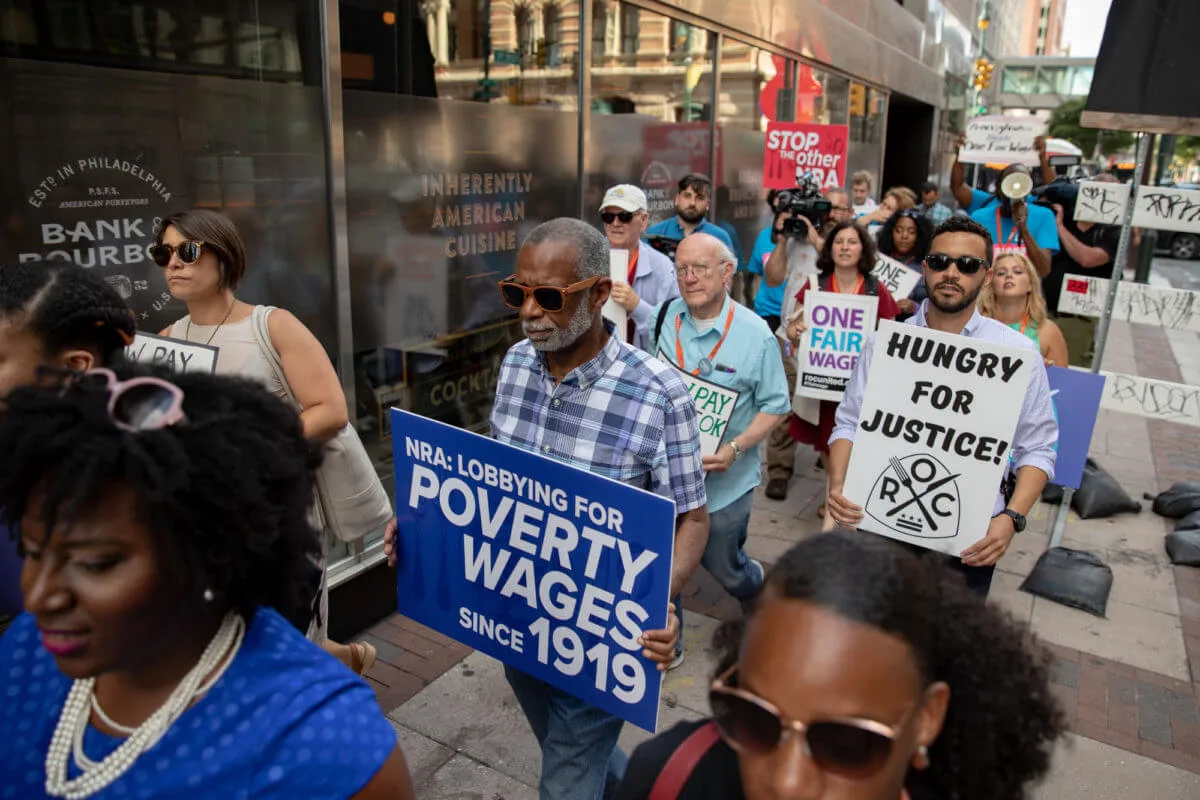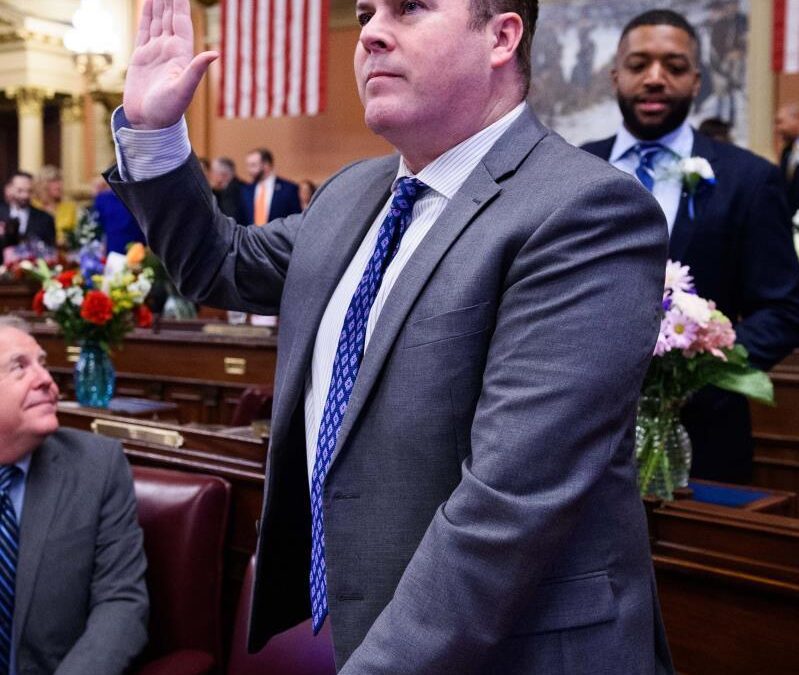
State Sen. Art Haywood (D-Philadelphia/Montgomery) and activists march to demand a higher minimum wage on July 12, 2019. (Pennsylvania Senate Democratic Caucus/James Robinson)
Several Democratic candidates said they are committed to fighting for a $15 minimum wage.
State Sens. Judy Schwank and Pam Iovino cosponsored and voted for the state Senate’s first minimum wage increase in over a decade, but they still think it’s not enough.
“It was the best offer by the majority with regard to this issue,” said Iovino (D-Allegheny/Washington).
The minimum wage is $7.25 per hour. Senate Bill 79 proposed immediately increasing the minimum wage to $8 per hour on July 1, 2020, and gradually increasing it until it reached $9.50 per hour on Jan. 1, 2022. It passed the state Senate in a 42-7 vote last November, and has been sitting in the state House Labor & Industry Committee ever since.
Iovino and Schwank, along with some other Democratic candidates for the state Senate, said they are committed to fighting to increase the minimum wage to $15 per hour.
Approximately 1.7 million Pennsylvanians work in jobs where they earn less than $15 per hour:
- 90,700 earn minimum wage or less, putting them below the federal poverty level if there are two people in their household and the minimum-wage job is their only job,
- 938,400 earn between $7.25 per hour and $12 per hour, putting them close to the poverty line, depending on how many people are in their household,
- and 679,500 earn between $12 per hour and $15 per hour.
Contrary to what some Republicans in the Legislature say, roughly 89% of the people who earn $15 per hour or less are adults.
Roughly 61% of people who earn less than $15 per hour are women.
Increasing the minimum wage to $15 per hour would “provide better financial stability for women, rural and tipped workers, enable thousands of people to work their way off public assistance and grow the economy for everyone,” said Lyndsay Kensinger, a spokesperson for Gov. Tom Wolf.
The governor’s office has estimated that increasing the minimum wage to $15 per hour would allow 70,000 Pennsylvania workers to work their way off Medicaid in two years, and save the state $150 million.
“Pennsylvania cannot afford to wait,” Kensinger said. “Nearly 30 states, including all our neighbors, have raised their minimum wage. It should be unacceptable to all of us that a Pennsylvanian earns less than someone in Ohio, West Virginia, or New Jersey for doing the same job.”
We asked candidates in key contested state Senate races whether they support raising the minimum wage and by how much. Below are their answers and information provided by their campaigns.
District 9 (Parts of Chester and Delaware Counties)
John Kane, Democratic Challenger: Kane, a member of Plumbers Local 690 in Pennsylvania, did not respond to The Keystone for comment. However, Kane’s campaign website notes, “Every State that borders Pennsylvania has a higher minimum wage than the Federal minimum, but our workers lag behind. Pennsylvania workers haven’t had a pay increase in over a decade. We must invest in our workforce to ensure a future for our families. I will go to Harrisburg and work tirelessly on behalf of workers in Pennsylvania.”
The Pennsylvania AFL-CIO and SEIU PA unions have endorsed him.
Thomas Killion, Republican Incumbent: Killion voted for Senate Bill 79.
While Killion has said he would support further increases and told The Keystone that he thought a $15 minimum wage “would be ideal” in southeastern Pennsylvania, he has also expressed hesitancy at increasing the minimum wage to that rate for all employees across the state.
District 11 (Part of Berks County)
Judy Schwank, Democratic Incumbent: Schwank has long been an advocate for raising the minimum wage, and she’s been known to bring groceries to rallies to show just how little the hourly wage can buy.
“We really need to be looking at the impact that the minimum wage and not raising the minimum wage is having on women and children, families in the Commonwealth,” she said at one rally. “It’s not what you think. It’s not just teenagers that are working to get some spare change. These are individuals that are trying to support a family, trying to support themselves. It’s important that we move forward on this as soon as possible.”
Schwank co-sponsored and voted for Senate Bill 79, but she has also said it isn’t enough.
“I’m committed to working toward raising the min wage further than this legislation dictates,” she said on Twitter.
She is also a cosponsor of Senate Bills 12 and 78.
Senate Bill 78 called for raising the minimum wage for tipped workers to $3.95 per hour on July 1, 2019, and then gradually increasing it starting in 2020. The bill has been sitting in the Senate Labor & Industry Committee since January 2019.
Senate Bill 12 called for raising the minimum wage to $12 per hour on July 1, 2019, and incrementally increasing the wage until it reaches $15 per hour on July 1, 2025. The bill also calls for an annual cost-of-living adjustment starting on July 1, 2026. The bill has been sitting in the Senate Labor & Industry Committee since March 2019.
The Pennsylvania AFL-CIO has endorsed Schwank.
Annette Baker, Republican Challenger: Baker told The Keystone that she supports raising the minimum wage—just not to $15 per hour.
“Otherwise, it will defeat the purpose of raising the minimum wage in the first place and force more workers out of jobs they need,” she said.
District 13 (Part of Lancaster County)
Janet Diaz, Democratic Challenger: Diaz, a healthcare worker who grew up in Lancaster, said on Facebook that her mother worked various minimum-wage jobs in the 1980s, when the minimum wage was just $3.35 per hour.
“We went hungry many times,” she said. “This is an issue that is very personal to me. Other states like New Jersey, New York, and West Virginia have raised their minimum wage. If they can do it, why can’t we?”
Diaz says on her campaign website that she supports a plan, put forward by Gov. Tom Wolf, to raise the minimum wage to $12 per hour in 2019, and then by 50 cents each year, so it reaches $15 per hour in 2025.
She also wants tipped workers to receive the minimum wage. She says, “One fair wage brings stability and reduces sexual harassment in the restaurant industry (knowing you have a reliable wage means you don’t have to put up with sexual harassment just for tips).”
Diaz says increasing the minimum wage will reduce the number of people who rely on social safety net programs like the Supplemental Nutrition Assistance Program (SNAP) and Medicaid. She says, “By bringing low income folks out of poverty, we can reduce costs to the state for these programs.”
The Pennsylvania AFL-CIO and SEIU PA have endorsed her.
Scott Martin, Republican Incumbent: Martin did not respond to The Keystone for comment.
When he first ran for the state Senate in 2016, Martin said he opposed any minimum wage increase.
He voted for Senate Bill 79 in 2019, but told LancasterOnline that he thought that was better than raising the overtime threshold.
District 15 (Parts of Dauphin and Perry Counties)
George Scott, Democratic Challenger: Scott, an Army veteran and Lutheran pastor, said he supports “an immediate increase in the minimum wage to at least $10 per hour, raising it to $15 per hour over the next several years, and then indexing it to inflation after that. A steady and predictable increase in the minimum wage will allow businesses to plan accordingly and will allow the consumers who power our economy to earn a living wage.”
The Pennsylvania AFL-CIO and SEIU PA have endorsed him.
John DiSanto, Republican Incumbent: DiSanto said he supports raising the minimum wage, but did not elaborate.
He voted for Senate Bill 79.
However, he is a majority member of the Senate Labor & Industry Committee, which has been sitting for months on several other bills that would raise the minimum wage.
District 17 (Parts of Delaware and Montgomery Counties)
Amanda Cappelletti, Democratic Candidate: Cappelletti, an attorney and vice chairperson of the East Norriton Board of Supervisors, told The Keystone that she supports raising the minimum wage to $15 per hour.
“It should be done incrementally over the course of several years,” she said. “This will give businesses time to adjust.”
She believes the issue should be one of the Legislature’s top priorities in 2021.
SEIU PA has endorsed her.
Ellen Fisher, Republican Candidate: Fisher did not respond to The Keystone for comment, but she has said she does not support Wolf’s proposal to raise the minimum wage to $12 per hour.
District 19 (Part of Chester County)
Carolyn Comitta, Democratic Candidate: Comitta, who is currently serving as a state representative, has long advocated for raising the minimum wage.
In 2017, Comitta was a cosponsor of House Bill 1520, which proposed raising the minimum wage to $12 per hour on Jan. 1, 2018, and gradually increasing it until it reached $15 per hour on Jan. 1, 2024.
House Bill 1520 also proposed raising the minimum wage for tipped employees to $9 per hour and then gradually increasing it until it reached $12 per hour on Jan. 1, 2024. The bill prohibited business owners from counting tips against the wages.
The bill also proposed an annual cost-of-living adjustment each year after 2025.
The bill was discharged from the House Labor & Industry Committee without any discussion in July 2017.
Comitta also cosponsored House Bill 1215 in 2019. That bill would have raised the minimum wage to $12 per hour on July 1, 2019, and increased it incrementally until it reached $15 per hour on July 1, 2025. The minimum wage would have increased by an annual cost-of-living adjustment each year after that. The bill has been sitting in the House Labor & Industry Committee since March 2019.
The Pennsylvania AFL-CIO and SEIU PA have endorsed her.
Kevin Runey, Republican Candidate: Runey did not respond to The Keystone for comment, but comments he has made to other outlets indicate that he does not support raising the minimum wage.
He told PA Family Voter, “The minimum wage is an arbitrary number that hurts entry level workers the most. Allowing competition and the market to dictate how much an individual is paid ultimately increases opportunity and eliminates businesses that refuse to pay their workers fair market value.”
District 25 (Cameron, Clinton, Elk, Jefferson, Mckean, Potter, Tioga, and Parts of Clearfield Counties)
Margie Brown, Democratic Challenger: Brown, a former teacher and journalist, supports raising the minimum wage.
“We need incremental raises commensurate with the cost of living in our district,” she said. “We are many dollars behind border states on minimum wage. It’s better for our local economies to have livable wages in the hands of the people who spend their money locally.”
The Pennsylvania AFL-CIO has endorsed her.
Cris Dush, Republican Challenger: Dush, who is currently a state representative, did not respond to The Keystone for comment.
However, in February, Dush referred to Wolf’s proposals to raise the minimum wage as “job-killing.”
He is a majority member of the state House Labor & Industry Committee, which has been sitting for months on Senate Bill 79, as well as numerous other bills and resolutions that would increase the minimum wage.
District 27 (Columbia, Montour, Northumberland, Snyder, and Parts of Luzerne Counties)
Michelle Siegel, Democratic Challenger: Siegel supports raising the minimum wage.
“It’s unacceptable that there are full-time workers who are relying on food stamps because they are paid so little,” she said. “I also support including tip workers in the minimum wage as well. When speaking with voters, I have found that many are shocked to learn that their tips are these workers wages and not a ‘reward’ for superior service.”
She said she thinks setting the rate for the minimum wage is “too complicated an issue to name merely one single amount.”
Siegel said she thinks “the baseline minimum wage should take into account criteria like the cost of living for the area and median income.”
The Pennsylvania AFL-CIO has endorsed her.
John Gordner, Republican Incumbent: Gordner did not respond to The Keystone for comment.
Gordner voted for Senate Bill 79.
In 2006, he voted against raising the minimum wage to $7.10, according to the Keystone Research Center.
District 31 (Parts of Cumberland and York Counties)
Shanna Danielson, Democratic Challenger: Danielson, a music teacher, said she supports Wolf’s proposal to raise the minimum wage to $12 per hour immediately and then incrementally over five years until it reaches $15 per hour.
“Pennsylvania workers need an increase,” she said. “Even a modest increase to $9/hour would be a boost.”
The Pennsylvania AFL-CIO and SEIU PA have endorsed her.
Mike Regan, Republican Incumbent: Regan voted for Senate Bill 79. But before that, Regan opposed any increase to the minimum wage.
On the campaign trail just four years ago, he opposed increasing the minimum wage to $8.75 per hour.
And the year before that, when he was a state representative, he joined other Republican state representatives from York and Adams counties in opposing any increase to the minimum wage.
District 37 (Parts of Allegheny and Washington Counties)
Pam Iovino, Democratic Incumbent: Iovino, a Navy veteran who won a special election to represent District 37, said she wants to incrementally raise the minimum wage to $15 by 2026.
“Without a higher wage we keep career advancement out of reach, and all but guarantee that low-income Pennsylvanians remain locked into a cycle of poverty,” she said on Facebook. “Having lagged behind every neighboring state in increasing the minimum wage, it is imperative that we continue to move towards a minimum wage that workers deserve.”
The Pennsylvania AFL-CIO has endorsed her.
Devlin Robinson, Republican Challenger: Robinson, a Marine veteran who works with different philanthropic groups, did not respond to The Keystone for comment, but he told WTAE in May that “now is not the time” to raise the minimum wage.
He said, “I don’t think an increase in the minimum wage would be a wise decision to help small businesses lift themselves out of the pandemic recession.”
District 49 (Parts of Erie County)
Julie Slomski, Democratic Challenger: Slomski, who previously worked for Gov. Tom Wolf as his Northwest Regional Director, supports a $15 minimum wage.
“I respect the ‘fight for 15’ and I get it,” she told GoErie.com in May. “I mean, it may take a while to get there to the true $15 an hour, but I do support that because that is a true family-sustaining wage, but it’s going to take some time and that’s where we need to really focus on working with like-minded legislators.”
Raising the minimum wage would especially help single mothers, Slomski told the Pennsylvania Capital-Star in March.
“One thing that bothers me, and I’ve heard this a few times talking to voters—single moms that are working two or three jobs to barely make ends meet and missing their children grow up, saying this is why we need family leave, this is why we need to increase the minimum wage,” she said.
The Pennsylvania AFL-CIO and SEIU PA have endorsed her.
Daniel Laughlin, Republican Incumbent: Laughlin did not respond to The Keystone for comment. He voted for Senate Bill 79.
The Keystone contacted candidates in Senate Districts 21, 23, 33, 35, 39, 41, 45, and 47, but they did not respond.
Politics

Philadelphia DA cancels arrest warrant for state Rep. Kevin Boyle on eve of Pa. primary
Philadelphia District Attorney Larry Krasner said a detective had sought the warrant against Boyle, a Democrat whose district includes a section of...

Influencers and creators find new ways to engage young Philadelphia voters
Rec Philly, a space for creators and influencers, teamed up with Show Up Strong to get hundreds of young Philadelphia residents engaged in the...

New Biden rule protects privacy of women seeking abortions
Under the new rules, state officials and law enforcement cannot obtain medical records related to lawful reproductive health care with the goal of...
Local News

Conjoined twins from Berks County die at age 62
Conjoined twins Lori and George Schappell, who pursued separate careers, interests and relationships during lives that defied medical expectations,...

Railroad agrees to $600 million settlement for fiery Ohio derailment, residents fear it’s not enough
Norfolk Southern has agreed to pay $600 million in a class-action lawsuit settlement for a fiery train derailment in February 2023 in eastern Ohio,...





